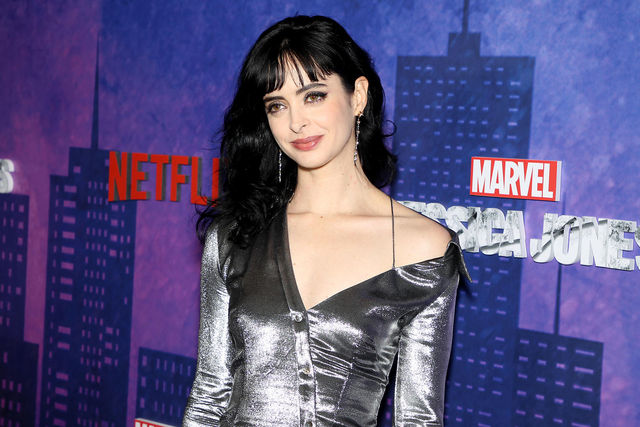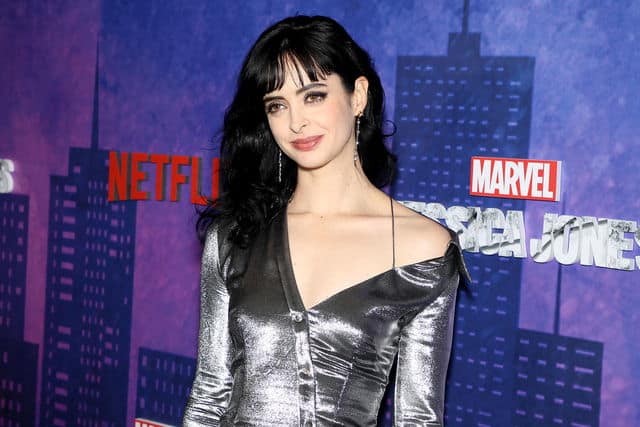BY Anna Greer IN TV

This weekend, you had better be bingewatching the new season of Jessica Jones. Netflix blessed us with season 2 of this women-centered, badass show on International Women’s Day. I went to the New York red carpet premiere the night before to get the scoop from the cast and creative minds behind the feminist series. The carpet was actually purple. And yes, all the actors I asked said they would consider themselves feminists.
Everyone I spoke to said we should be very, very excited for Season 2. Janet McTeer (can’t tell you who she plays because that would be a major spoiler) said it’s “bigger, bolder, braver, more messed up.”
Season 1 ended with Jessica Jones (played by current BUST cover gal Krysten Ritter) killing her rapist Kilgrave (David Tennant) and facing an uncertain future as a hero. Jessica Jones is a marvel (see what I did there?) of a show, combining noir with superhero action to explore the darker aspects of reality, especially sexual violence. Head of Marvel Television and writer of one of my favorite Batman comics, Jeph Loeb, said, “We’ve always found the best stories that we tell start with what’s going on out there… what’s happening in our world… That’s the thing that people are finding special and unique.”
Sexual violence is especially relevant with the prominence of the #MeToo movement. I asked if some of the cast members could anticipate something as big as Time’s Up or #MeToo would change the context for viewers months after they finished filming. Leah Gibson, who plays Inez Green, answered, “I feel like the movement has been slow-building in our industry for a little while now and as things do they gain momentum. And expand. And the female spirit is so grand and so large, and it has snowballed. And become the time of the now.”
As for art imitating life and life imitating art, Ritter told BUST in her cover story interview that she has been approached by survivors of sexual violence who told her how much Jessica Jones affected them. “What resonates with me and what excites me is that the character affects people in that way. And everyone should feel represented, and everyone should feel heard and seen, and if people feel seen and heard by a character like Jessica Jones, that’s really exciting to me as a performer,” she told me. This was after we both jumped up and down over our mutual excitment about her being a BUST cover gal.
Women were both in front of and behind the camera, and that didn’t change with season 2. All the episodes were directed by women, which was not the industry norm for many of the cast members. But they loved it, and said it reflected their own lives. Gibson said, “I feel proud and blessed to have been part of this show on season 2 with the female initiative that was already under way.” It was the first time she had worked on a project with all women directors, and she hoped it would be the first of many.
Maury Ginsburg, who portrays Steven Benowitz, said, “It was so wonderful and so important. There should be more of it.” Wil Traval (Will Simpson) said, “It just feels normal, right? This is what the show is. It’s always been run by women it makes the show great. I grew up with a single mother so a woman running the show is normal for me.”
At the same time, multiple people expressed their desire for it not to be something that was the center of attention (or the subject of my questions). Loeb said, “I look forward to a time where asking these kinds of questions is not the subject of the moment, but in fact is something that everyone is doing and something that we always try to do at Marvel. In general our feeling is we don’t care whether or not you’re a woman, you’re a man, or you’re an alien, that if you have talent we want you working at Marvel.”
They make great points, but I think that sentiment misses the inherent value in storytelling by women, people of color, LGBTQ2+ folks, or any other marginalized groups that have been left out of crafting the mainstream narrative. There is value in lived experience, and narrative becomes a tool for breaking down barriers. Obviously everyone behind the Jessica Jones is very talented and that’s why it’s a success. It’s also a success because the creators’ raw talent and hard work was shaped by perspective and lived experience. And there was a giant audience that connected with that.
This is why we should celebrate Jessica Jones. I, too, would love to live in a world where it wasn’t special to have kickass superhero show starring women and run by women, or to have a lead cast with people of color, or for queer characters to be in complicated relationships on televisions everywhere. In the meantime, I’m going to be snuggled up on the couch, drinking La Croix, and watching Jessica Jones.
Top photo by Marion Curtis/Netflix
Anna Greer is an editorial intern and a senior at the University of Tennessee, where she studies comics and human rights. When she is not engaged in feminist activism, she usually can be found wearing Doc Martens and looking at Star Wars prequel memes.

